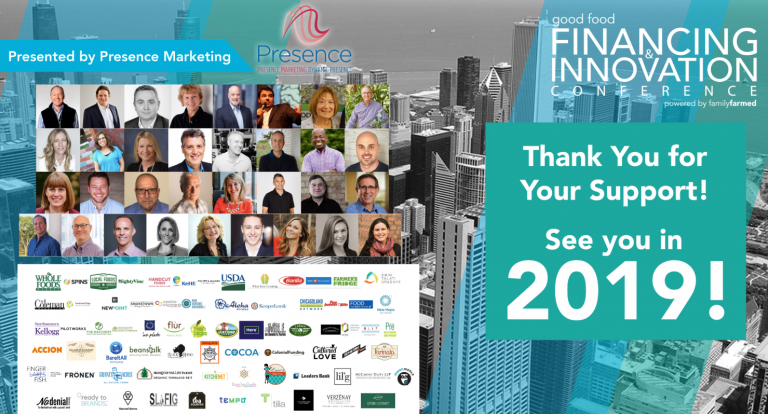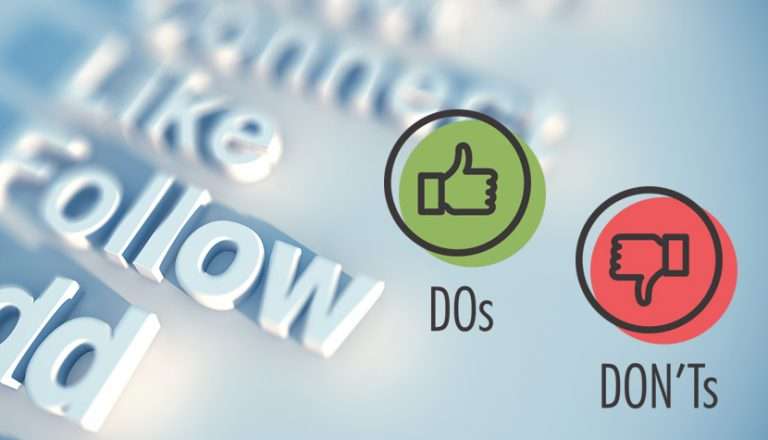Nov 6, 2018
Social Media Marketing Workshop Q&A 3: Social Media Boosting and Geotargeting
Your Questions Answered: Q3 Social Media Boosting and Geotargeting
Here we are for Social Media Marketing round 3. A reminder of what we’re doing here: When it comes to Social Media Marketing – Emerging Food Brands have some questions. And they brought them to the NewPoint Emerging Food Brands Conference.
I know you know this, but here’s a quick recap: The content of this Social Media Boosting and Geotargeting portion (and all program content at our conference) was submitted as questions during registration by the 64 food company/brand attendees. Our expert presenters then addressed the questions—and more—in their programs. In the coming weeks, we’ll be posting each presentation to the “Intel” section of our website. So check back often!
Question #3 part 1: What’s the best approach for social media ads?
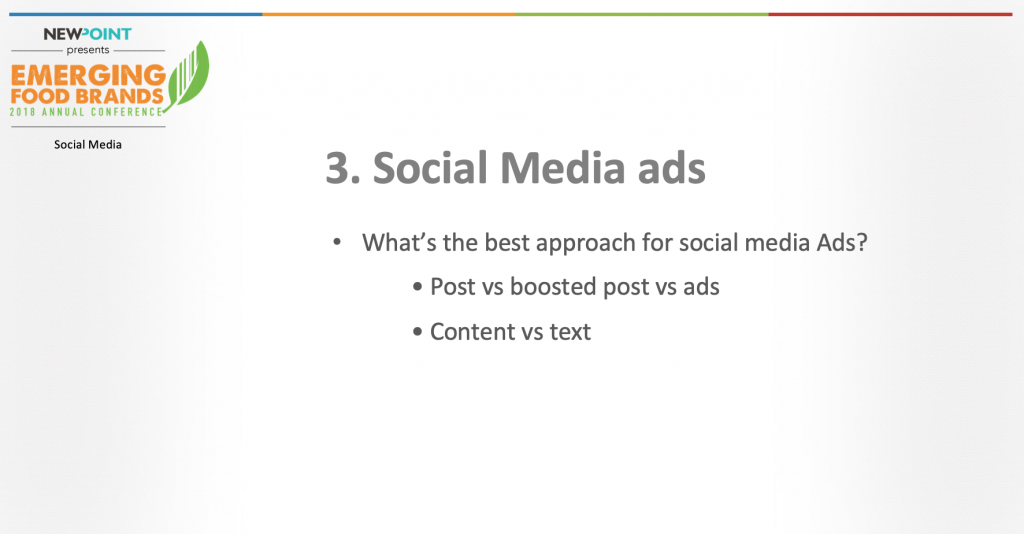
If you have your own brand/business page, you can make organic posts. These are posts that you create for free to your followers. These posts go to only about a third of your following.
If you want to grow your audience, you can do a “boosted post.” Boosting simply means adding money to your post. Boosted posts give you all of these targeting options to put your content in front of people who might be interested in your brand. With boosting, you can get your post in newsfeeds of people who do not follow you but have the potential to become followers—or even better, to buy your product. You can “target” these new people in different markets and from other demographic and psychographic information they have voluntarily provided to the social platform. For instance, people who follow or like organics or gluten-free products or interests can be targeted for your boosted post.
Facebook is very cost-effective and works well for many food brands. A brand can boost posts for budgets ranging from $10 to my team or to me and up. It is scalable for any budget depending on the brand’s goals.
The difference between a boosted post and an ad
A boosted post can be created through your brand business page and, simply put, you can use the targeting tools and add the budget that fits. Ads have to be created in the Facebook Ad Manager. The content can be the same as any boosted post, but you have the ability to target smaller audiences under 1,000 people. The concept is that a better-targeted audience will increase engagement.
Ads have to be reviewed by Facebook before they can run. This means that ads are not instantaneous. Here are a few important ad content rules: Don’t create a lot of text within the graphic/image of your ad. In other words, the text needs to be less than 25% of the overall image in your ad. Otherwise, it will be rejected by Facebook.
You can do a lot more things with ads than you can with a boosted post. For example, they have a feature called the carousel. If you have multiple products, the carousel feature makes it easy for people to see all of the products you have to offer. Customers find the carousel really easy to click through and buy.
Question #3 part 2: Finding and Reaching your Target Market

We talked some about audience and demographics in the last post: Social Media Marketing Workshop Q2: Selling & Coupons. Most social media platforms have extensive targeting. Here is an excellent post from the Social Media Examiner on “How to Refine Your Facebook Audience for Better Ad Targeting.” Keep in mind that you minimize risk by starting very small—in budgeting, time boosted, and target audience—when you begin the process of social media boosting and geotargeting.
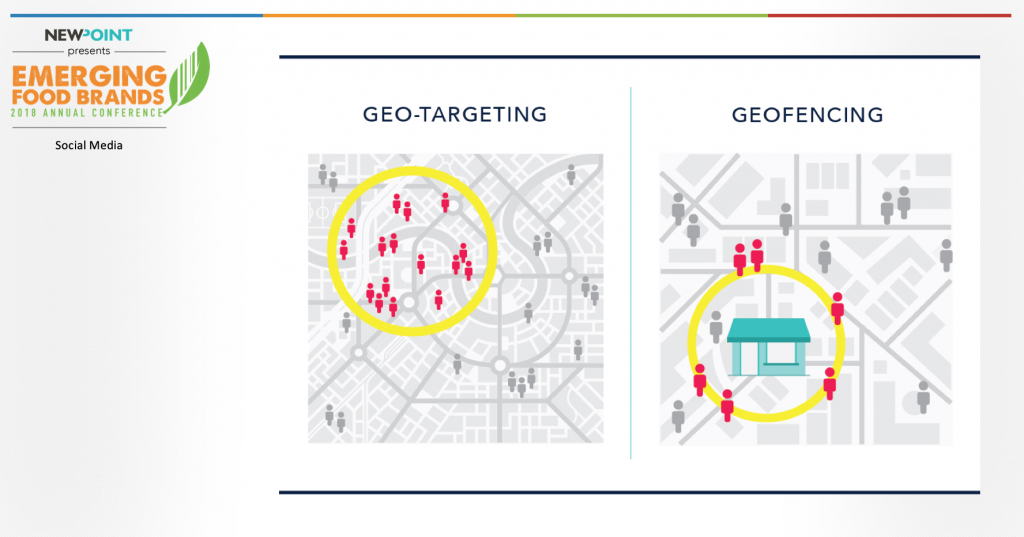
Geofencing vs. Geotargeting
Geofencing is a way to connect with people who are within a certain radius of an area you want to reach, like a retail store your product is in.
Geotargeting is a way to connect with an audience with common interests in a specific geographic area.
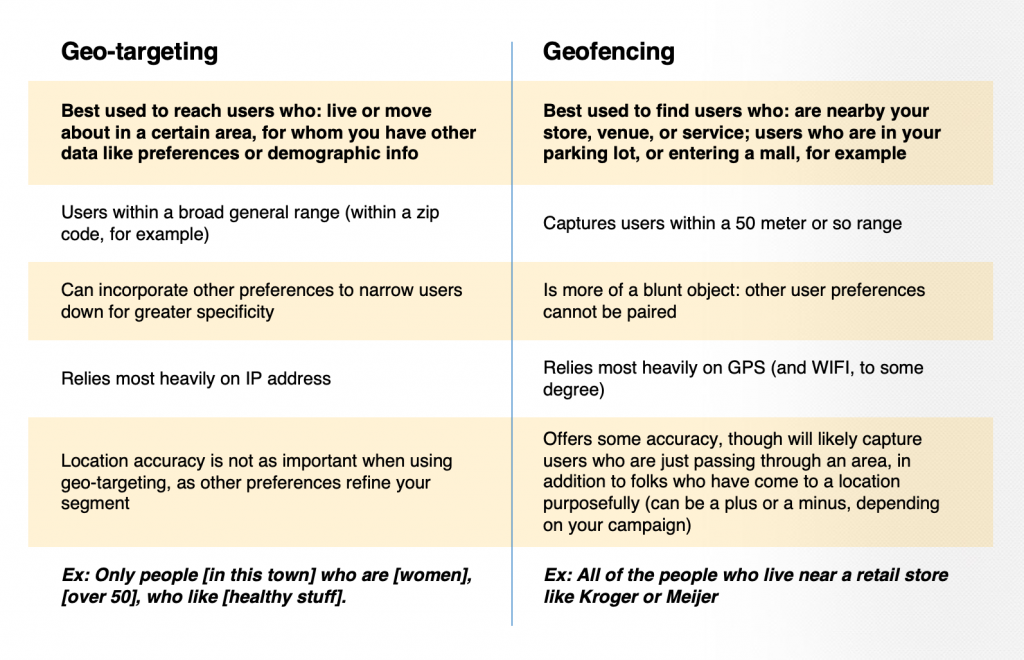
As a food brand, many of you have the goal of getting your product into retail stores. If you do have a product in a retail store, a great way to help drive people to their stores—and help support turns on shelves—is with Geofencing and Geotargeting geographically.
Facebook and other social media make this easy by allowing you to define the radius around the store your product is in. You can use boosted posts or ads to let customers know that you are in that store. One strategy we like to see: Use the data showing your targeting and package it up to present to that and other retailers. Your retailer will want to see how you are using social media to drive traffic to his/her store and are helping to promote your products.
Once again, a reminder. We offered these caveats in our Social Media Boosting and Geotargeting workshop and they need to remain a constant as we post our answers to your questions:
- Every brand and company is different: Your social planning may not fit into the formats discussed here. But it helps to look at these guidelines as a starting point.
- Social media marketing is always evolving: It helps to stay dialed in on your chosen social platform analytics as well as trends in posting strategies.
- This post is by no means all you need to know. There are a ton of great resources to draw advice on social media sales. The above are a few questions that food attendees asked for the social media workshop. Here are a few resources that offer a more in-depth (and more thorough) dive:
- Social Media Advertising 101: How to Get the Most out of Your Budget by HootSuite.com
- Boost Posts or Promoted Posts on Facebook: Which is Better? by SocialMediaExaminer.com
- Boost Your Social Media Advertising Success with These 6 Pro Tips! by TopRankBlog.com
- Location Marketing: When To Choose Geofencing, Geo-Targeting, Or Beaconing Services by Braze.com
- The Basics Of Geotargeting And Geofencing by TributeMedia.com
- Lots of great resources in this post: How to Learn Social Media Marketing: 31 Resources for Beginners
Up next: Keep your eyes peeled for our next post answering questions about Social Media Marketing Workshop Q4: ROI.
Got questions about Social Media Boosting and Geotargeting—or just want to talk social media marketing? Let me know at patrick@newpointmarketing.com. I’m happy to talk!
Let’s keep Moving Your Brand Up the Food Chain!

Patrick Nycz
Founding President
NewPoint


